化学专业英语Abstract写作
- 格式:ppt
- 大小:199.00 KB
- 文档页数:51
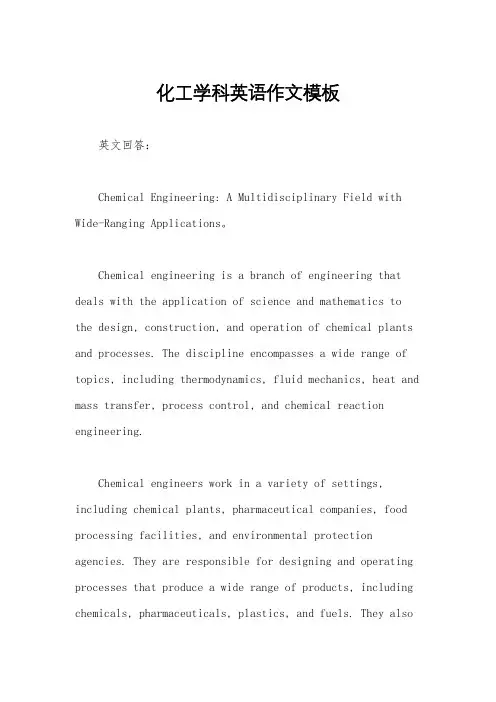
化工学科英语作文模板英文回答:Chemical Engineering: A Multidisciplinary Field with Wide-Ranging Applications。
Chemical engineering is a branch of engineering that deals with the application of science and mathematics to the design, construction, and operation of chemical plants and processes. The discipline encompasses a wide range of topics, including thermodynamics, fluid mechanics, heat and mass transfer, process control, and chemical reaction engineering.Chemical engineers work in a variety of settings, including chemical plants, pharmaceutical companies, food processing facilities, and environmental protection agencies. They are responsible for designing and operating processes that produce a wide range of products, including chemicals, pharmaceuticals, plastics, and fuels. They alsowork to develop and improve processes that are more efficient, less polluting, and safer.Chemical engineering is a rapidly growing field, as the demand for chemicals and other products continues to increase. In addition, the need for sustainable and environmentally friendly processes is driving the development of new technologies and processes in the field.Key Features of Chemical Engineering。
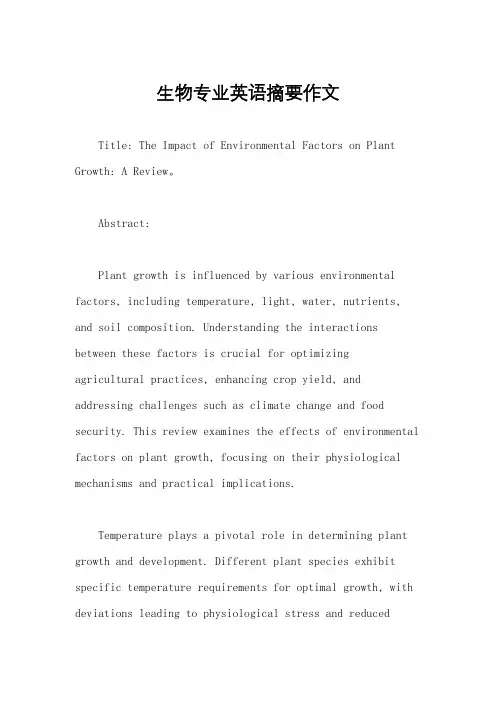
生物专业英语摘要作文Title: The Impact of Environmental Factors on Plant Growth: A Review。
Abstract:Plant growth is influenced by various environmental factors, including temperature, light, water, nutrients, and soil composition. Understanding the interactions between these factors is crucial for optimizingagricultural practices, enhancing crop yield, and addressing challenges such as climate change and food security. This review examines the effects of environmental factors on plant growth, focusing on their physiological mechanisms and practical implications.Temperature plays a pivotal role in determining plant growth and development. Different plant species exhibit specific temperature requirements for optimal growth, with deviations leading to physiological stress and reducedproductivity. High temperatures can accelerate metabolic processes but may also cause heat stress and damage cellular structures, while low temperatures can impair enzyme activity and inhibit growth. Plant responses to temperature variations involve complex signaling pathways and gene expression regulation, highlighting the need for adaptive strategies in agriculture to mitigate temperature-related stresses.Light availability and quality profoundly influence photosynthesis, the primary process driving plant growth. Plants have evolved diverse mechanisms to perceive and utilize light, including photoreceptors that respond to specific wavelengths. Light intensity, duration, and spectral composition affect plant morphology, flowering, and overall productivity. Understanding light requirements enables growers to optimize cultivation practices, such as adjusting light exposure in controlled environments or selecting suitable crops for specific light conditions.Water availability is critical for plant survival, as it serves as a solvent for nutrient uptake and maintainsturgor pressure in cells. Drought stress impairs water uptake and can lead to stomatal closure, reducing photosynthetic activity and growth rates. Conversely, excessive water can cause root suffocation and nutrient leaching, compromising plant health. Developing drought-tolerant cultivars and implementing water-efficient irrigation techniques are essential strategies for sustainable agriculture in water-limited environments.Nutrient availability is another key determinant of plant growth, as essential elements such as nitrogen, phosphorus, and potassium are required for various metabolic processes. Soil composition, pH, and microbial activity influence nutrient availability and uptake efficiency. Imbalances or deficiencies in nutrient supply can impair plant growth and render crops more susceptible to pests and diseases. Precision agriculture techniques, including soil testing and targeted fertilization, help optimize nutrient management and minimize environmental impacts.Soil composition and structure affect root development,nutrient retention, and water infiltration, thereby influencing plant growth dynamics. Soil degradation, erosion, and compaction pose significant challenges to agricultural productivity and ecosystem resilience. Conservation tillage, cover cropping, and organic amendments are practices that improve soil health and mitigate erosion risks, enhancing long-term sustainability in agriculture.In conclusion, environmental factors profoundly influence plant growth and agricultural productivity. By understanding the complex interactions between temperature, light, water, nutrients, and soil, growers can implement targeted strategies to optimize crop performance, conserve resources, and mitigate environmental risks. Advancements in research and technology will continue to drive innovation in sustainable agriculture, ensuring food security and environmental stewardship for future generations.Keywords: plant growth, environmental factors,temperature, light, water, nutrients, soil, agriculture, sustainability。
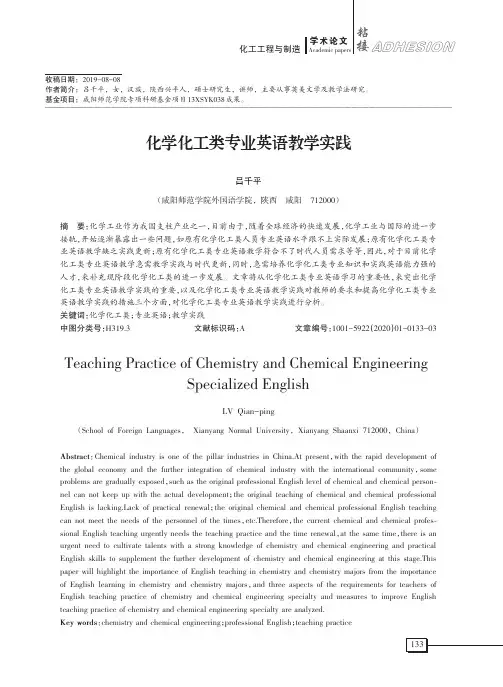
化学化工类专业英语教学实践吕千平(咸阳师范学院外国语学院,陕西咸阳712000)摘要:化学工业作为我国支柱产业之一,目前由于,随着全球经济的快速发展,化学工业与国际的进一步接轨,开始逐渐暴露出一些问题,如原有化学化工类人员专业英语水平跟不上实际发展;原有化学化工类专业英语教学缺乏实践更新;原有化学化工类专业英语教学符合不了时代人员需求等等,因此,对于目前化学化工类专业英语教学急需教学实践与时代更新,同时,急需培养化学化工类专业知识和实践英语能力强的人才,来补充现阶段化学化工类的进一步发展。
文章将从化学化工类专业英语学习的重要性,来突出化学化工类专业英语教学实践的重要,以及化学化工类专业英语教学实践对教师的要求和提高化学化工类专业英语教学实践的措施三个方面,对化学化工类专业英语教学实践进行分析。
关键词:化学化工类;专业英语;教学实践中图分类号:H319.3文献标识码:A文章编号:1001-5922(2020)01-0133-03Teaching Practice of Chemistry and Chemical EngineeringSpecialized EnglishLV Qian-ping(School of Foreign Languages ,Xianyang Normal University ,Xianyang Shaanxi 712000,China )Abstract :Chemical industry is one of the pillar industries in China.At present ,with the rapid development ofthe global economy and the further integration of chemical industry with the international community ,some problems are gradually exposed ,such as the original professional English level of chemical and chemical person⁃nel can not keep up with the actual development ;the original teaching of chemical and chemical professional English is ck of practical renewal ;the original chemical and chemical professional English teaching can not meet the needs of the personnel of the times ,etc.Therefore ,the current chemical and chemical profes⁃sional English teaching urgently needs the teaching practice and the time renewal ,at the same time ,there is an urgent need to cultivate talents with a strong knowledge of chemistry and chemical engineering and practical English skills to supplement the further development of chemistry and chemical engineering at this stage.This paper will highlight the importance of English teaching in chemistry and chemistry majors from the importance of English learning in chemistry and chemistry majors ,and three aspects of the requirements for teachers of English teaching practice of chemistry and chemical engineering specialty and measures to improve English teaching practice of chemistry and chemical engineering specialty are analyzed.Key words :chemistry and chemical engineering ;professional English ;teaching practice收稿日期:2019-08-08作者简介:吕千平,女,汉族,陕西兴平人,硕士研究生,讲师,主要从事英美文学及教学法研究。
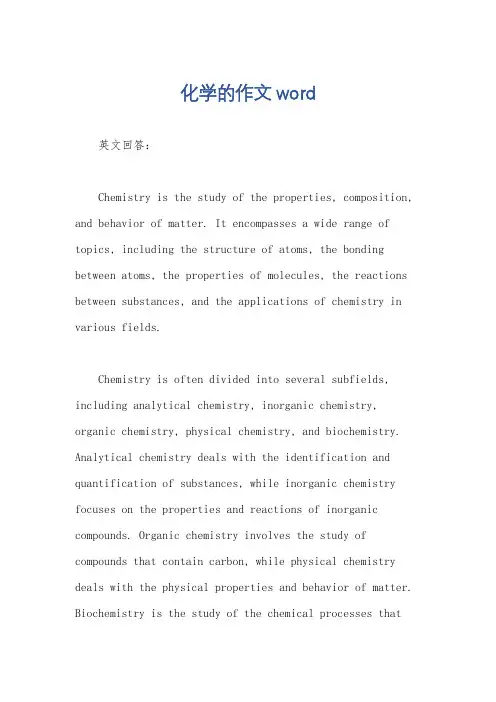
化学的作文word英文回答:Chemistry is the study of the properties, composition, and behavior of matter. It encompasses a wide range of topics, including the structure of atoms, the bonding between atoms, the properties of molecules, the reactions between substances, and the applications of chemistry in various fields.Chemistry is often divided into several subfields, including analytical chemistry, inorganic chemistry, organic chemistry, physical chemistry, and biochemistry. Analytical chemistry deals with the identification and quantification of substances, while inorganic chemistry focuses on the properties and reactions of inorganic compounds. Organic chemistry involves the study of compounds that contain carbon, while physical chemistry deals with the physical properties and behavior of matter. Biochemistry is the study of the chemical processes thatoccur in living organisms.Chemistry is a fundamental science that has applications in many fields, including medicine, agriculture, materials science, and environmental science. For example, chemistry is used to develop new drugs, fertilizers, and materials, and to monitor and mitigate environmental pollution.Chemistry is a complex and challenging subject, but it can also be very rewarding. By understanding the basic principles of chemistry, students can gain a deeper understanding of the world around them and develop the skills necessary to solve real-world problems.中文回答:化学是一门研究物质的性质、组成和行为的学科。
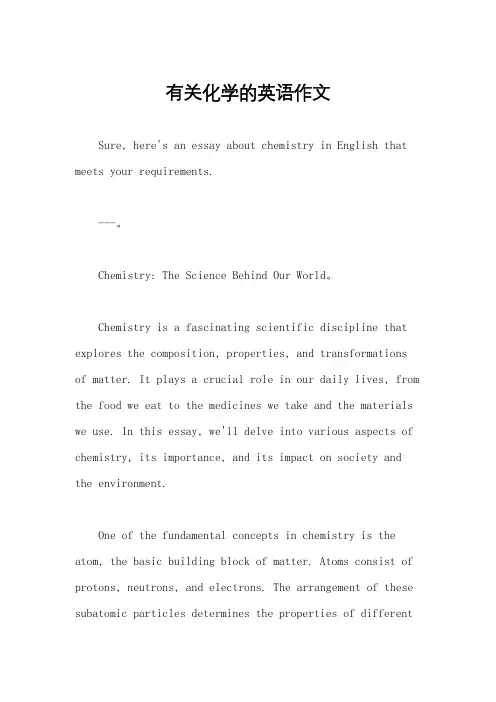
有关化学的英语作文Sure, here's an essay about chemistry in English that meets your requirements.---。
Chemistry: The Science Behind Our World。
Chemistry is a fascinating scientific discipline that explores the composition, properties, and transformations of matter. It plays a crucial role in our daily lives, from the food we eat to the medicines we take and the materials we use. In this essay, we'll delve into various aspects of chemistry, its importance, and its impact on society and the environment.One of the fundamental concepts in chemistry is the atom, the basic building block of matter. Atoms consist of protons, neutrons, and electrons. The arrangement of these subatomic particles determines the properties of differentelements. For instance, carbon atoms have six protons,while oxygen atoms have eight. This variance in atomic structure leads to the vast diversity of elements and compounds that form the basis of chemistry.Chemical reactions are another core aspect of chemistry. These reactions involve the breaking and forming ofchemical bonds between atoms, resulting in the creation of new substances with unique properties. Understanding chemical reactions is essential for developing new materials, drugs, and technologies. For example, pharmaceutical companies rely on chemistry to design and synthesize effective medications that treat various ailments.The periodic table of elements is a cornerstone of chemistry, organizing elements based on their atomic number, electron configuration, and chemical properties. Dmitri Mendeleev's development of the periodic tablerevolutionized the field of chemistry, providing a systematic framework for understanding and predicting the behavior of elements. Today, the periodic table continuesto evolve as new elements are discovered and synthesized in laboratories.One of the most significant applications of chemistry is in environmental science. Environmental chemists study the interactions between pollutants, natural substances, and ecosystems. They work to develop strategies for mitigating pollution, conserving resources, and promoting sustainable practices. For instance, advancements in green chemistry focus on reducing the environmental impact of chemical processes by minimizing waste and using renewable resources.The field of biochemistry explores the chemical processes within living organisms. It delves into the structure and function of biological molecules such as proteins, carbohydrates, lipids, and nucleic acids. Biochemists investigate how these molecules interact to support life functions, from metabolism to genetic information transfer. Their research contributes to advancements in medicine, biotechnology, and agriculture.Chemistry also plays a crucial role in industry and technology. Chemical engineers design processes for producing chemicals, fuels, and materials on a large scale. They optimize production efficiency, reduce costs, and ensure product quality and safety. From the manufacture of plastics and polymers to the production of clean energy sources like solar cells and batteries, chemistry underpins numerous industries that drive economic growth and innovation.In conclusion, chemistry is a multifaceted science with vast applications and implications. Its principles govern the behavior of matter at the atomic and molecular levels, shaping our understanding of the natural world and driving advancements in various fields. From fundamental research to practical applications, chemistry continues to enrich our lives and pave the way for a more sustainable and technologically advanced future.---。
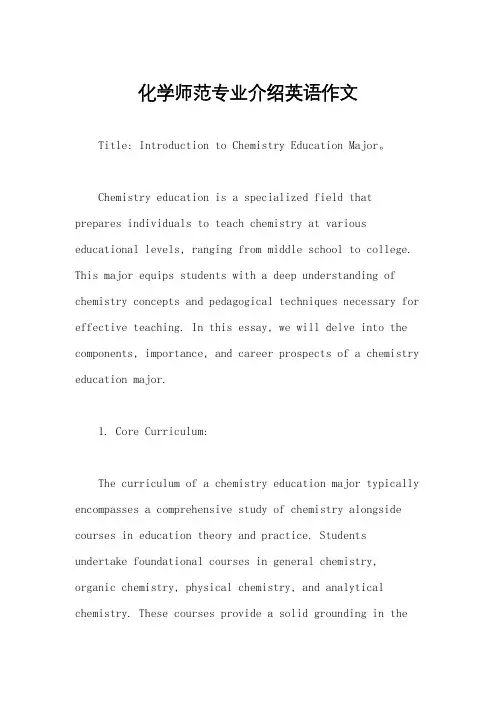
化学师范专业介绍英语作文Title: Introduction to Chemistry Education Major。
Chemistry education is a specialized field that prepares individuals to teach chemistry at various educational levels, ranging from middle school to college. This major equips students with a deep understanding of chemistry concepts and pedagogical techniques necessary for effective teaching. In this essay, we will delve into the components, importance, and career prospects of a chemistry education major.1. Core Curriculum:The curriculum of a chemistry education major typically encompasses a comprehensive study of chemistry alongside courses in education theory and practice. Students undertake foundational courses in general chemistry, organic chemistry, physical chemistry, and analytical chemistry. These courses provide a solid grounding in theprinciples and applications of chemistry, which isessential for effective teaching.Additionally, students engage in education-focused courses that cover topics such as curriculum development, classroom management, educational psychology, and teaching methodologies. These courses are designed to equip future educators with the skills and knowledge needed to create engaging lesson plans, assess student learning, and foster a conducive learning environment.2. Importance:Chemistry education plays a crucial role in cultivating scientific literacy and fostering interest in the natural sciences among students. By imparting knowledge of fundamental chemical concepts and phenomena, chemistry educators help students develop critical thinking skills and scientific inquiry abilities. Moreover, a strong foundation in chemistry is essential for understanding various real-world issues, such as environmental sustainability, energy production, and healthcare.Furthermore, chemistry education contributes to the development of a skilled workforce in science, technology, engineering, and mathematics (STEM) fields. By inspiring students to pursue careers in chemistry and related disciplines, educators play a key role in addressing societal challenges and driving innovation.3. Career Prospects:Graduates of chemistry education programs are well-equipped for a variety of career paths in education and related fields. Many pursue teaching positions at middle schools, high schools, and community colleges, where they educate students on the principles of chemistry and inspire a passion for science.Others may choose to work in informal education settings, such as museums, science centers, or outreach programs, where they engage the public in hands-on science activities and demonstrations. Additionally, some graduates may opt for roles in educational administration, curriculumdevelopment, or science policy, where they can influence educational practices and policies on a broader scale.Overall, a degree in chemistry education opens up diverse career opportunities for individuals passionate about both chemistry and teaching, allowing them to make a meaningful impact on the lives of students and society as a whole.In conclusion, a chemistry education major provides students with the knowledge, skills, and experiences necessary to become effective chemistry educators. By combining a deep understanding of chemistry with pedagogical expertise, graduates of this program play a vital role in promoting scientific literacy, fostering interest in the natural sciences, and preparing the next generation of scientists and innovators.。

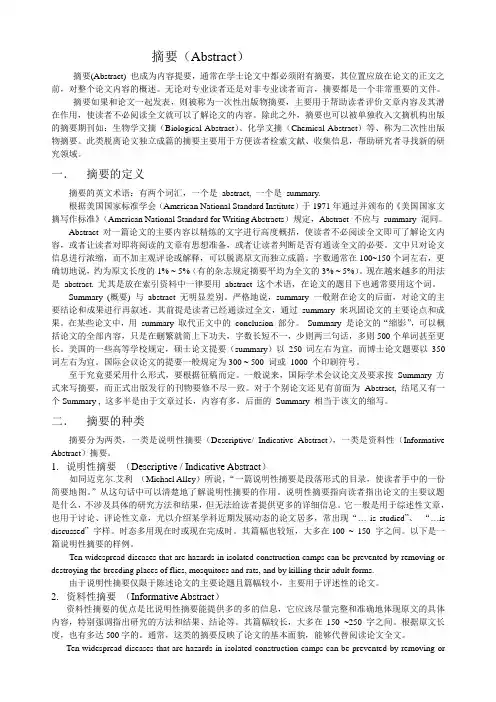
摘要(Abstract)摘要(Abstract) 也成为内容提要,通常在学士论文中都必须附有摘要,其位置应放在论文的正文之前,对整个论文内容的概述。
无论对专业读者还是对非专业读者而言,摘要都是一个非常重要的文件。
摘要如果和论文一起发表,则被称为一次性出版物摘要,主要用于帮助读者评价文章内容及其潜在作用,使读者不必阅读全文就可以了解论文的内容。
除此之外,摘要也可以被单独收入文摘机构出版的摘要期刊如:生物学文摘(Biological Abstract)、化学文摘(Chemical Abstract)等、称为二次性出版物摘要。
此类脱离论文独立成篇的摘要主要用于方便读者检索文献、收集信息,帮助研究者寻找新的研究领域。
一.摘要的定义摘要的英文术语:有两个词汇,一个是abstract, 一个是summary.根据美国国家标准学会(American National Standard Institute)于1971年通过并颁布的《美国国家文摘写作标准》(American National Standard for Writing Abstracts)规定,Abstract 不应与summary 混同。
Abstract 对一篇论文的主要内容以精炼的文字进行高度概括,使读者不必阅读全文即可了解论文内容,或者让读者对即将阅读的文章有思想准备,或者让读者判断是否有通读全文的必要。
文中只对论文信息进行浓缩,而不加主观评论或解释,可以脱离原文而独立成篇。
字数通常在100~150个词左右,更确切地说,约为原文长度的1% ~ 5%(有的杂志规定摘要平均为全文的3% ~ 5%)。
现在越来越多的用法是abstract. 尤其是放在索引资料中一律要用abstract 这个术语,在论文的题目下也通常要用这个词。
Summary (概要) 与abstract 无明显差别。
严格地说,summary 一般附在论文的后面,对论文的主要结论和成果进行再叙述。
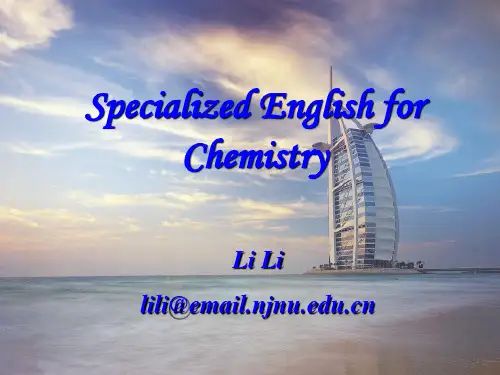

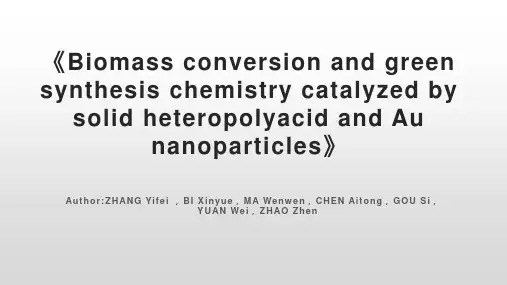
1大学化学专业英语---英文文献示例英文文献示例大学化学类专业,大三开始开专业英语课,本篇英语文献是在学术网下载的一篇示例文献,供学生练习翻译和初步接触正式阅读英文文献。
练习翻译和初步接触正式阅读英文文献。
——题记Chemical modification of silica silica-gel -gel with diethylenetriamine via an end-group protection approach for adsorption to Hg(II)ABSTRACTFour kinds of silica-gel supported diethylenetriamine adsorbents with different structures, were preparedby so-called ‘heterogeneous heterogeneous-direct--direct--direct-amination’amination’’ (hetero (hetero--DA), ‘homogeneous homogeneous- - direct-amina direct-amination’’ tion’’ (homo (homo--DA), ‘‘heterogeneous end end--group protection’’ (hetero (hetero--EGP), and ‘‘homogeneous end-group pr protection’’ otection’’ (homo (homo-EGP) -EGP) methods, respectively. The obtained products were named SG-HE-dD, SG-HO-dD, SG-HE-pD and SG-HO-pD, respectively (where SG means silica-gel; HE means heterogeneous, HO means homogeneous, d means direct, p means protected and D means diethylenetriamine). Their structures were characterized by FT-IR, elemental analysis, porous structure analysis and thermogravimetric analysis. The adsorption capabilities of such adsorbents towards Hg(II) were studied and evaluatedby static method.SG-HE-pD and SG-HO-pD showed higher performance towards Hg(II) adsorption than corresponding counterparts SG-HE-dD and SG-HO-dD, even though the former two possessed lower contents of diethylenetriamine (DETA). The kinetics data indicated that the adsorption proce ss was governed by the film diffusion and followed pseudo-pseudo-fifirst-order rate model for SG-HE-dD,SG-HO-dD and SG-HE-pD and pseudo-second-order model for SG-HO-pD.The Langmuir model was applied to fit the experimental equilibrium data for all adsorbents.The end-group protection method exhibited its advantage in preparation of effective adsorbent for metal ions uptake compared to the direct-amination method. Keywords:Chemical modification of silica Chemical modification of silica-gel -gel Diethylenetriamine End-group protection Adsorption Hg(II)1. IntroductionAs a result of heavy metal ion release from industrial wastewater, water pollution has become a serious problem. Waste streams contain solutions of metal ions, such as mercury, nickel,copper, lead, and so on. In particular, mercury compounds which are harmful to human health and aquatic life must be removed from sewage down to extremely low concentrations. Many literatures have discussed the removal of metal ions from aqueous solutions using approaches based upon adsorption, solvent extraction and polymeric membranes [1[1––4]. Recently, researches have reported the application of organic molecule-functionalized mesoporous silica-gel for the removal of metal ions from aqueous solution[5[5––7]. In this method, the organic molecule anchored on the surface of silica-gel relied on coordination bonding to the metals. Thus the approach featured advantages over those used in other methods because of its good selectivity for metal ions and free operation. Moreover, silica-gel was used as an matrix, not only due to the facility of immobilization process, but also to be relatively simple in comparison to organic polymers, with fastermetal ion-exchange kinetics, good swelling resistance in different solvents, and chemical stability [8]. It followed that a similar polyamine approach could be applied to metal ion-containing aqueous solutions via chelation on amine groups using silica-gel modified with polyamines [9polyamines [9––10].Anchoring an organic polyamine on the silica-gel surface via covalent bond is the most reliable method for preparing silica-gel-based adsorbents [11,12]. The direct heterogeneous synthesis and homogeneous synthesis have often been used for these purposes[13purposes[13––15].2. Experimental2.1. Materials and methodsSilica-gel obtained from Tenghai Chemical Institute, Qingdao,Shandong, China, with particle size in the range 6060––100 mesh was treated and activated as before [17]. The silylant agent 3-glycidoxypropyltrimethoxysilane (GPTS, Qufu Wanda Chemicals Factory, China) and salicylaldehyde (Sal, Shanghai Chemical Factory, China) were used without further purification; diethyle-netriamine (DETA) and toluene were distilled under reduced pressure just before use. Solvents used were of analytical reagent grade. Stock solutions of Hg(II) (0.1 mol dmÀ3) were prepared as follows: analytical reagent grade Hg(NO3)2ÁH2O was dissolving in 20 cm3 (0.5 mol dmÀ3) of HNO3 to avoid hydrolysis, then diluted to 1000 cm3. The buffer solution of pH 1.01.0––2.0 was adjusted to a desired value with HNO3/H2O and pH3.0HNO3/H2O and pH 3.0––6.0 was adjusted with sodium acetate/acetic acid solutions. 2.2. Preparation of SG-HE-dD, SG-HO-dD, SG-HE-pD and SG-HO-pDThe preparation of SG-HE-dD, SG-HO-dD, SG-HE-pD and SG-HO-pD (where SG means silica-gel; HE means heterogeneous, HO means homogeneous, d means direct, p means protected and D means diethylenetriamine) was according to the approach described in Ref. [21]. The typical procedures as follows.Hetero-DA method: 20.0 g of silica-gel reactivated with 20 cm3(92.0 mmol) of GPTS in toluene, under reflux of the solvent in dry nitrogen. After filtering and washing, the solid (SG-G) was dried.Then SG-G (10.0 g) was reacted with DETA (26.1 cm3, 240.1 mmol) and the solid was filtered, washed and dried, to obtain the product,SG-HE-dD.Homo-DA method: GPTS (10 cm3, 46.0 mmol) reacted with DETA(10 cm3, 92.0 mmol) in methanol (100 cm3). The mixture was refluxed under a nitrogen atmosphere for 12 h and the solution was concentrated to approximately 60 cm3. The resulting compound GD reacted with 10.0 g of silica-gel suspended in 100suspended in 100 cm3 of dry toluene. The final solidcm3 of dry toluene. The final solid was filtered, extracted and dried, to obtain the product, SG-HO-dD. Hetero-pD method: The Schiff base, diethylenetriamine bissalicylaldehyde (DETA-(DETA-bS),bS), was first produced by the method described in the literature [22]. DETA-bS (30.0 g) reacted with 10.0 g of SG in methanol. After refluxing, the solid was filtered,extracted and dried, to obtain the compound, SG-HE-DS. The salicylaldehyde was liberated during hydrolysis and the product SG-HE-pD was obtained as reported [19]. The product SG-HE-DS(6.3 g) was stirred with 100 cm3 of HCl (6 mol dmÀ3) at 333 K for 24 h and salicylaldehyde was liberated as yellow oil during the hydrolysis. Yellow product SG-HE-pD in the hydrochloride form was filtered off, washed with ethanol and dried under vacuum. The resulting product in the free amine form was obtained by stirring with distilled water by adding sodium hydroxide (pH 8.0hydroxide (pH 8.0––9.0) till pH of solution remained at 8.08.0––9.0 for 2 h. Then it was washed by distilled water until the washings were neutral.Homo-pD method: 24.0 g of DETA-bS reacted with 8 cm3(37.5 mmol) of GPTS in 100 cm3 of methanol. The mixture was refluxed under dry nitrogen atmosphere and the solvent was evaporated subsequently. This condensed solution reacted with silica-silica-gel of 8.0 g in dry toluene. After refluxing, the gel of 8.0 g in dry toluene. After refluxing, the solid was filtered, washed and dried to give the product named SG-HO-DS. The resulting product SG-HO-pD was obtained during hydrolysis as previously described [19].2.3. Effect of pH on adsorptionThe effect of pH on the adsorption of Hg(II) was studied by adding 50.0 mg of silica-gel adsorbents to 1 cm3 of 0.1 mol dmÀ3 Hg(II) and 19 cm3 of buffer solution at different pH values in 100 cm3 Erlenmeyer flask. This mixture was mechanically shaken for 24 h at 303 K to attain equilibrium. Then a certain volume of the solutions was separated from the adsorbents and the residual concentration of Hg(II) was detected by means of AAS. The adsorption amount was calculated according to the equation.q=(C0-C)V/Wq, the adsorption amount (mmol gÀ1), C0 and C, the initial and the final concentrations of metal ions in solution, respectively(mmol cmÀ3), V, the volume (cm3), W, the weight of SG-HE-dD, SG -HO-dD,SG-HE-pD and SG-HE-pD (g).2.4. Adsorption kineticsAdsorption kinetics were performed by mixing a 30 mg of silica-gel adsorbents with 20 cm3 of Hg(II)(5.0 Â 10À3 mol dmÀ3,pH 4.0) solution in a 100 cm3 Erlenmeyer flask at 293 K. One milliliter of the solution was taken at different time intervals,where the residual concentration of Hg(II) was determined via AAS.2.5. Adsorption isothermsComplete adsorption isotherms were obtained by soaking 30 mg of dry adsorbents in a series of flasks containing 20 cm3 of different initial metal ion concentrations varying from 0.625 to 10 mmol dmÀ3 for 3 h. The initial pH was adjusted to 4.0 for Hg(II) while keeping the temperature at 293 K. Later onthe residual concentration was determined where the Hg(II) uptake was estimated.3. Results and discussion3.1. PreparationA direct reaction of the synthesized silylant agent with activated silica-gel in non-aqueous solvent yields the immobilized compound. When the objective was to expand the organic chain, in order to include a series of desirable functions, two main routes are followed: (i) heterogeneousroutes are followed: (i) heterogeneous——the previous anchored silica-gel reacts to another molecule or (ii) homogeneoushomogeneous—the—the silylant agent is firstly prepared before immobilizing [14]. In present paper,we reported the similar incorporation of DETA through heterogeneous and homogeneous methods and chose GPTS as coupling agent to link silica-gel and functional molecular DETA. The procedures were represented in Scheme 1(A, B). A uniform distribution of ligands on the surface of silica-gel prepared by nhomogeneous route was considered better than by the heterogeneous route [13]. However, homogeneous route still cannot avoid intra- and inter-strand bridging reactions due to N-alkylation at the primary amine groups and secondary amine in DETA [16]. These cross-linking reactions should decrease the amount of immobilized ligand (DETA). Moreover, complicated cross-linkings should bring about steric restrictions on the formation of metal chelate.In attempting to eliminate undesirable cross-linkings and increase the adsorption capacity, we protected the primary amine groups of the DETA by Schiff base formation prior to immobilization, and then the original amine could be regenerated by acid hydrolysis. The objectives, SG-HE-pD and SG-HO-pD, were presumed to have a structure as depicted in Scheme 1, in which GPTS had the unique chance to react with the secondary amine of DETA.4. ConclusionThe following conclusions can be deduced from t he above results:(1) FT-(1) FT-IR and elemental analysis confirmed the four IR and elemental analysis confirmed the four kinds of efficient modification of diethylenetriamine bridged by 3-glycidoxypropyltrimethoxysilane on silica-gel.(2) The BET surface area, BJH desorption average pore diameter and BJH desorption cumulative volume of pores of silica-gel decreased after functionalization. On condition that the N content was low for SG-HE-pD and SG-HO-pD, their values of BET surface area, BJH desorption average pore diameter and BJH desorption cumulative volume of pores were respectively larger than those for SG-HE-dD and SG-HO-dD for the larger pores were stuffed because of the serious cross-linking during the direct-amination reaction and the hydrogen bonding interactions between basic amino groups and residual silanols.(3) Thermogravimetric analysis revealed that the adsorbents prepared by heterogeneous reaction had higher stability(almost 673 K) although a low adsorption capacity. And those four kinds of adsorbents can be applied in the case of no more than 523 K.(4) The maximum adsorption capacity was observed on SG-HO-pD, although a lower N content than SG-HO-dD was observed.The maximum adsorption of all adsorbent occurred at pH 4.0 for Hg(II). An adsorption kinetics study indicated that pseudo-pseudo-fifirst-order rate model provided an excellent fitting of SG-HE-dD, SG-HO-dD and SG-HE-pD and pseudo-second-order model provides an excellent fitting of SG-HO-pD. The isotherm adsorption data of Hg(II) on all adsorbents was well fitted by the Langmuir isotherm model. References[1] E. Guibal, Interactions of metal ions with chitosan-based sorbents: a review, Sep. Purif. Technol. 38 (2004) 43Technol. 38 (2004) 43––74.[2] J.P. Ruparelia, S.P. Duttagupta, A.K. Chatterjee, S. Mukherji, Potential of carbon nanomaterials for removal of heavy metals from water, Desalination 232 (2008)145232 (2008)145––156.[3] H. Deligoz, Emin Erdem, Comparative studies on the solvent extraction of transition metal cations bycalixarene, phenol and ester derivatives, J. Hazard. Mater.154 (2008) 29Mater.154 (2008) 29––32.[4] A. Vijayalakshmi, D.L. Arockiasamy, A. Nagendran, D. Mohan, Separationof proteins and toxic heavy metal ions from aqueous solution by CA/PC blend ultrafiltration membranes, Sep. Purif. Technol. 62 (2008) 32Technol. 62 (2008) 32––38.[5] Y . Shiraishi, G . Nishimura, T. Hirai, I. Komasawa, Separation of transition metals using inorganic adsorbents modified with chelating ligands, Ind. Eng. Chem. Res.41 (2002) 5065Ind. Eng. Chem. Res.41 (2002) 5065––5070.[6] B.J. Gao, F.Q. An, K.K. Liu, Studies on chelating adsorption properties of novel composite material polyethyleneimine/silica gel for heavy-metal ions, Appl. Surf. Sci. 253 (2006) 1946ions, Appl. Surf. Sci. 253 (2006) 1946––1952.[7] R.K. Dey, C. Airoldi, Designed pendant chain covalently bonded to silica gel for cation removal, J. Hazard. Mater. 156 (2008) 95removal, J. Hazard. Mater. 156 (2008) 95––101.[8] P .K. Jal, S. Patel, B.K. Mishra, Chemical modification of silica sur surface face by immobilization of functional groups for extractive concentration of metal ions, Talanta 62 (2004) 1005–1028.[9] J. Kramer, W.L. Driessen, K.R. Koch, J. Reedijk, Highly selective and efficient recovery of Pd, Pt, and Rh from precious metal-containing industrial effluentswith silica silica-based -based (poly)amine ion exchangers, Sep. Sci. Technol. 39 (2004) 63–75.[10] L. Bois, A. Bonhomme, A. Ribes, B. Pais, G . Raffin, F . Tessier, Functionalized silica for heavy metal ions adsorption, Colloids Surf. A 221 (2003) 221221––230.[11] E.M. Soliman, M.E. Mahmoud, S.A. Ahmed, Synthesis, characterization and struc ture effects on selectivity properties of silica gel covalently bonded diethylene- triamine mono- and bis-bis-salicylaldehyde salicylaldehyde and naphthaldehyde Schiff’s bases towards some heavy metal ions, Talanta 54 (2001) 24354 (2001) 243––253.[12] J.A.A. Sales, C. Airoldi, Epoxide silylant agent ethylenediamine reaction product anchored on silica gel gel––thermodynamics of cation thermodynamics of cation––nitrogen interaction at solid/liquid interface, J. Non-Cryst. Solids 330 (2003) 142142––149.[13] J.A.A. Sales, A.G A.G.S. .S. Prado, C. Airoldi, The incorporation of propane-1,3-diamine into silylant epoxide group through homogeneous and heterogeneous routes, Polyhedron 21 (2002)26472647––2651. [14] A.G A.G.S. .S. Prado, L.N.H. Arakaki, C. Airoldi, Adsorption and separation of cations on silica gel chemically modified by homogeneous and heterogeneous routes with the ethylenimine anchored on thiol modified silica gel, Green Chem. 4 (2002) 4242––46.[15] D. Perez-Quintanilla, I. del Hierro, M. Fajardo, I. Sierra, Mesoporous silica functionalized with 2-mercaptopyridine: Synthesis, characterization and employment for Hg(II) adsorption, Microporous Mesoporous Mater. 89 (2006) 58Mesoporous Mater. 89 (2006) 58––68.[16] R.J. Qu, Y .Z. Niu, C.M. Sun, C.N. Ji, C.H.Wang, G.X. Cheng, Syntheses,characterization, a nd adsorption properties for metal ions of silica-g el functionalized by ester- andamino-terminated dendrimer-like polyamidoamine polymer, Microporous Mesoporous Mater. 97 (2006) 5858––65. [17] Y [17] Y. Zhang, R.J. Qu, C.M. Sun, B.H. Qu, X.Y . Zhang, R.J. Qu, C.M. Sun, B.H. Qu, X.Y . Zhang, R.J. Qu, C.M. Sun, B.H. Qu, X.Y. Sun, . Sun, C.N. Ji, End-group protection as a novel strategy to prepare silica-gel supported diethylenetriamine with high adsorption capacities for metal ions, J. Non-Cryst. Solids, in press.[22] B.W.M. Coleman, L.T. Taylor, Pentadentate ligands. I. Nickel(II) complexes of the linear Schiff base ligands derived from substituted salicylaldehydes and diethylenetriamine and 2,20 -bis(aminopropyl)amine, Inorg. Chem.10(1971) 21952195––2199.小结:读英语文献,想要读准、读快,没有投机取巧的捷径,只有不懈的积累,才能正真厚积薄发。
2011年春季学期应用化学专业08级化学化工专业英语试卷答案1. state-of-the-industry 中文:工业发展水平 1分2. alkyl ether sulfate中文:烷基醚硫酸盐酯分3. W/O 英文: water in oil,oil emulsion ;中文:油乳胶油包水分4. 2,6-Dimethy-2,7-octadien-6-ol 画出结构式:4分5. The inherent tendency of the whole or a part of a molecule to pass out of or not to penetrate into a water phase.英文: Hydrophoby ;中文:疏水性亲油性分6. A substance which, when introduced in a liquid, increases its wetting tendency.英文: Wetting agent ;中文:润湿剂分7. The process by which soil is dislodged from the substrate and bought into a state of solution or dispersion.英文: Detergency ;中文:去污性力分8. An attribute which is related to benefit not directly but through association or suggestion.英文: Signal attribute ;中文:信号属性分9. A colorless gas with a characteristic pungent odor, consisting of nitrogen and hydrogen.英文: ammonia ;中文:氨气 2分10. A chemical compound composed of two oxygen atoms covalently bonded to a single carbon atom.英文: Carbon dioxide ;中文:二氧化碳 2分11. A chemical element with atomic number 9, it is the lightest halogen.英文: Fluorine ;中文:氟 2分12. KH2PO4 Potassium dihydrogen phosphate 2分13. ZnSO4·7H2O Zinc sulfate heptahydrate 2分14.3-methyl-2-ethyl-1-butene 3-methyl-2-ethyl but-1-ene 分15.4-1-ethyl-butayl-5-hydroxy-2-hexayne-1-al 分16. A good example of such a versatile attribute is fragrance. 2分译文:这样一个多功能属性的好例子就是香味;17. Surface active amine oxides are also classified as nonionic surfactants. 2分译文:表面活性胺氧化物也被归类为非离子表面活性剂;18. Fragrances that signal desirable benefits are also perceived as pleasing. 2分译文:那些能显示产品具有某些人们所需的功能的香气,同时也是令人愉悦的;19. Products have attributes: they have form, size, price, efficacy, names, fragrance. 2分译文:产品具有一些属性:它们有类型、尺寸、价格、效能、名称和香味;20. Foaming and cleaning agents are basic constituents of shampoos and cleansers. 2分译文:起泡剂和清洁剂是洗发香波和洁面乳的主要组分;21. What goes unnoticed is how much higher quality the other constituents now are. 2分译文:现在其他的组分提高了多高的质量这件事往往被忽略22. Table 1 gives an overview of the most important substance types assigned to the four surfactant classes. 3分译文:表1提供了归属于四种表面活性剂种类的最重要的物质类型的一个概观;23. Experts recently submitted for discussion the classification of cosmetic preparations shown in Table 1. 3分译文:专家们最近提交了关于如表1所示化妆品制剂分类的讨论结果; 24. Surfactants are substances with molecular structures consisting of a hydrophilic and a hydrophobic part. 3分译文:表面活性剂是分子结构由一个亲水基和一个疏水基组成的物质; 25. Up front are those products, that make the cleaning of the hair possible, and such that help to improve the styling effect. 3分译文:前面提及的是那些能够清洁头发从而帮助提高头发的发型效果的产品;26. In solvents such as water, the surfactant molecules distribute in such a manner, that their concentration at the interfaces is higher than in the inner regions of the solution. 5分译文:在像水这样的溶剂中,表面活性剂分子以这样一种方式分布,就是它们在界面处的浓度比溶液内部区域的浓度要高;27. She is familiar with this brand through advertising she has seen, it costs the same as her regular brand, and she has every expectation that this brand works just about as well as her regular brand. 6分译文:通过她看过的广告她熟悉这个品牌,它这个牌子的产品与她经常用的品牌价格相同,所以她非常希望这个品牌的产品用起来和她经常用的品牌一样的好;28. While this is true for the manufacturing of any cosmetic, emulsions are particularly delicate: small deviations in the procedure of raw material specifications can bring about marked changes in product viscosity/consistency and stability. 7分译文:而对于任何化妆品的制造这都是事实,即乳化是特别微妙的:即使是与原材料说明书步骤中很小的偏离,都会在产品黏性和稳定性方面带来显着的变化;29. Moreover, like other surface active substances, soap not onlyremoves the protective skin surface lipid films, but simultaneously releases appreciable amounts of fatty substances and constituents responsible for the moisture retention capacity from the stratum corneum. 8分译文:而且,类似其他的表面活性物质,肥皂不仅仅可以去除有保护作用的皮肤表面的脂质膜,而且同时可以从角质层释放出大量与保湿能力有关的脂肪类物质和成分;Lesson 50 The Role of Fragrance in Consumer Product参考答案Abstract:Fragrance is applied in various areas, such as skin care products, oral care products, hair care products and so on. In this article, the role of fragrance in consumer products will be discussed. Besides the basic functional attribute, the aesthetic and signal attribute of fragrance will be hightlighted; and the fuller use of the potential of fragrance will lead to more successful products.。
什么是化工英文作文英文:Chemical engineering is a branch of engineering that deals with the design, development, and operation of chemical processes and equipment. It involves the use of chemistry, physics, mathematics, and economics to solve problems related to the production and use of chemicals, fuels, drugs, food, and other products. Chemical engineers work in a wide range of industries, including oil and gas, pharmaceuticals, food and beverage, plastics, and environmental engineering.As a chemical engineer, I have been involved in the development of new processes for producing chemicals and materials. For example, I worked on a project to develop a new method for synthesizing a polymer that is used in medical devices. This involved designing and building a new reactor system, optimizing reaction conditions, and testing the product to ensure that it met the requiredspecifications.Another aspect of chemical engineering is process optimization. This involves analyzing existing processes to identify inefficiencies and areas for improvement. For example, I worked on a project to optimize a production process for a specialty chemical. We were able to reducethe cycle time, increase yield, and improve product quality, which resulted in significant cost savings for the company.中文:化学工程是一种工程学科,涉及化学过程和设备的设计、开发和操作。
Production Process And The Pros and Cons of DoubleMetal Pipe ProductAbstract:This paper describes the status of the metallurgical complex double metal pipe at home and abroad, introduces the main ways of product and compares the advantages and dis advantages of different production technique.Key Words:Bimetallic composite pipe,Production process,Pros and Cons 1.IntroductionOils and gas industry as an important foundation of the national economy have been valued by all countries in the world. With the rapid development of national economy, the demand for energy is growing. The oils and gas reserves are enormous in our country and we must pave lots of pipelines between above and below ground if we want to change these oils and gas into energy what we can be used. Since oil and gas widely distributes in our country and contain different compositions. The Cl*. CO2. H2S and others damage compositions will corrode the pipelines in different degree. Aim to different corrosive medium we must use different pipelines product by different materials. To product the pipe network from corroding by CO2. H2S and other corrosion gas, these pipelines made by stainless steel, nickel base alloy and other precious alloy. So the cost of pipelines is high, but if using metallurgical complex double metal pipe to replace these pipes with old materials that can substantially lower investment and cost of production. Metallurgical complex double metal pipe is bimetallic pipes that unit by plain carbon steel, low alloy steel and special precious metal. The work layer is stainless steel, nickel base ally and other precious metal to meet the condition that resistant to corrosion, resistant to elevate temperature, resistant to wear and other special requirements. The work layer definesas multiple layer usually, and another layer defines as supporting layer. Otherwise metallurgical complex double metal pipe can meet the requirement of complex working condition and reduce the cost greatly.2.The main process technology of metallurgical complex doublemetal pipeMetallurgical complex double metal pipe used in every walk of life widely. According to different requirement the ways and material composite are variously. When the inner as work layer and contact with corrosion medium, the multiple layer in inner, such as, oil and gas transmission pipeline, chemical liquid transmission and heart exchange pipes of corrosion medium. When outside contacts with corrosion medium, the multiple layer in inner, for example, heart exchange tube used in paper making. There are many different ways to composite duplex metal, such as, explosive composite, hot rolling composite, cool rolling composite and powder metallurgy composite and so on. Nowadays, consider cost and technology, there are four main ways to produce double metal pipe as follows:(1)Inner diffuseness. Using two different types of pipes through together. For example, outside layer is normal steel and inner layer is light gauge stainless pipes. Then ventilation with high pressure internally, the inner pipes will occurred plastic deformation and the outside pipes occurred elastic deformation. So the two types of different pipes can unit tightly and form to metallurgical complex double metal pipe.(2)Decrease the diameter of outside pipe.Also using two different types of pipes through together and then rolling or drawing to the outside pipe.The two pipes composed and form rough pipe of metallurgical complex double metal pipe.(3)Explosion ing two different types of pipes through together and explosion in inner pipe. The inner and outside pipe will becost by explosion and form product rough pipe of metallurgical complex double metal pipe.(4)Centrifugal casting.In the rough of inner or outside that made by hot extrusion centrifugal casting different material,then form rough pipe of metallurgical complex double metal pipe.All of the rough double metal pipe must go through post processing that can form products to meet the requirement of customer. The after treatment includes hot rolling, cool rolling, drawing and so on. Different post processing has its own features.3.The pros and cons compared of technology of double metal pipeIn this paper, four kinds of technology have their respective advantages and disadvantages. In actual production choose appropriate ways based on production condition, production cost and the use environment of products. I make a simple compare to these process technologies above mentioned in this paper.(1)The first and the second ways of organization are not flexible that limited by the number of production and its suitable to product large mount numbers but the advantage is that cost of production are low. The most shortage is that they are not belong to metallurgy bonding completely but belong to machine compound. The shear strength of combined course in double metal are only part of other two ways. Using 304L/20G pipes as an example, interface shear strength can attain 500MPa produced by other two ways, but the interface shear strength only 250~300MPa produced by these two ways.(2)The third way not limited by the number of production, not only fit to mass production but also suit to single production. But the shortage is that its organization is difficult. The most important is that the product process is dangerous and needs special work environment and protectivemeasures, the cost is higher. The advantage is that its shear strength of combined course in double metal can attain high standard about 500MPa.(3)The last way has advantages same as the third,not limited by the number of production and has high shear strength of combined.At the same time the organization is flexible.But the disadvantage is that the amount of work is large,need special equipment and workers,otherwise,has higher cost.(4) Not only blank pipe production process will impact the quality of the final products, but the way of post processing will influence the quality of final products. We need choose different after treatment based on different material and produce ways of rough pipes. Cooling rolling is fit for the material with poor malleability and work hardening. On the country, the hot rolling and drawing are fit for the material has good malleability.The quality of final products has different features produce by different ways and different after treatments. According to requirement and product conditions to choose right produce way and post processing in actual production process.4.ConclusionWe can know that metallurgical complex double metal pipe is a kind of new material with excellent performance that can replace traditional pipes and decrease the cost from this paper. The frequently used four production technologies each with its own features. We can not judge the way is good or not only by one aspect. Choosing appropriate process technology and post processing based on the actual production conditions, products used environment and production cost.At the same time, the double metal composite tube production preparation technology, connection and use also there are many unsolved problems. These questions need us to solve in the process of furtherin-depth study. We can imagine such a sight that composite material production and life in the future will play more and more important role.。
(完整版)化学专业英语一、基础词汇篇1. 原子与分子Atom(原子):物质的基本单位,由质子、中子和电子组成。
2. 化学反应Reactant(反应物):参与化学反应的物质。
Product(物):化学反应后的物质。
Catalyst(催化剂):能改变化学反应速率而本身不发生永久变化的物质。
3. 物质状态Solid(固体):具有一定形状和体积的物质。
Liquid(液体):具有一定体积,无固定形状的物质。
Gas(气体):无固定形状和体积的物质。
4. 酸碱盐Acid(酸):在水溶液中能电离出氢离子的物质。
Base(碱):在水溶液中能电离出氢氧根离子的物质。
Salt(盐):由酸的阴离子和碱的阳离子组成的化合物。
5. 溶液与浓度Solution(溶液):由溶剂和溶质组成的均匀混合物。
Solvent(溶剂):能溶解其他物质的物质。
Solute(溶质):被溶解的物质。
Concentration(浓度):溶液中溶质含量的度量。
二、专业术语篇1. 有机化学Organic Chemistry(有机化学):研究碳化合物及其衍生物的化学分支。
Functional Group(官能团):决定有机化合物化学性质的原子或原子团。
Polymer(聚合物):由许多重复单元组成的大分子化合物。
2. 无机化学Inorganic Chemistry(无机化学):研究不含碳的化合物及其性质的化学分支。
Crystal(晶体):具有规则排列的原子、离子或分子的固体。
OxidationReduction Reaction(氧化还原反应):涉及电子转移的化学反应。
3. 物理化学Physical Chemistry(物理化学):研究化学现象与物理现象之间关系的化学分支。
Chemical Bond(化学键):原子间相互作用力,使原子结合成分子。
Thermodynamics(热力学):研究能量转换和物质性质的科学。
4. 分析化学Analytical Chemistry(分析化学):研究物质的组成、结构和性质的科学。
专业英语文献翻译Quantifying the Cluster of Differentiation 4 Receptor Density on Human T Lymphocytes Using Multiple Reaction Monitoring Mass Spectrometry. ABSTRACT: Cluster of differentiation 4 (CD4) is an important glycoprotein containing four extracellular domains, a transmembrane portion and a short intracellular tail. It locates on the surface of various types of immune cells and performs a critical role in multiple cellular functions such as signal amplification and activation of T cells. It is well-known as a clinical cell surface protein marker for study of HIV progression and for defining the T helper cell population in immunological applications. Moreover, CD4 protein has been used as a biological calibrator for quantification of other surface and intracellular proteins. However, flow cytometry, the conventional method of quantification of the CD4 density on the T cell surface depends on antibodies and has suffered from variables such as antibody clones, the ommatophore and conjugation chemistries, the fixation conditions, and the flow cytometric quantification methods used. In this study, we report the development of a highly reproducible na no liquid chromatography−multiple reaction monitoring mass spectrometry-based quantitative method to quantify the CD4 receptor density in units of copy number per cell on human CD4+ T cells. The method utilizes stable isotope-labeled full-length standard CD4 as an internal standard to measure endogenous CD4 directly, without the use of antibodies. The development of the mass spectrometry-based approach of CD4 protein quantification is important as a complementary strategy to validate the analysis from the cytometry-based conventional method. It also provides new support for quantitative understanding and advanced characterization of CD4 on CD4+ T cells.Cluster of differentiation 4 (CD4) is a glycoprotein that locates on the surface of immune cells such as T helper cells, monocytes, macrophages, and dendritic cells. As a co receptor, CD4 amplifies the signal generated by the T cell receptor, which is essential for activation of many molecules involved in the signaling cascade of an activated T cell. In human T lymphocytes, CD4 receptor protein is encoded by the CD4 gene1and has four distinct extracellular domains (D1 to D4), a transmembrane portion, and a short intracellular tail.2The use of antihuman CD4 monoclonal antibodies generated against the four extracellular domains has been widely used to define T helper cells in phenotypical. Although the number of CD4+ T cells decreases in the progression of HIV-1 viral infection deriving from the gp120 viral protein binding to the CD4 receptor, Ponce let et al. reported that the surface CD4 density stillremained constant on T helper cells of HIV-1 infected individuals.3Since then, multiyear research has supported the theory that CD4 expression/density can be used as a biological calibrator for quantification of other surfaceand intracellular proteins.4Quantitative multicolor flow cytometry incorporating anti- bodies and a fluorescence detection method has played a critical role in clinical diagnostics and immunotherapies. Though the ultimate objective of quantitative flow cytometry is to measure the number of antigens or ligand binding sites associated with a cell, the task is carried out by measuring the number of antibodies bound per cell (ABC). It is critically important to produce biological cell reference materials that bear well-characterized protein markers such as CD4 for the trans-formation of a calibrated linear fluorescence intensity scale of a flow cytometer channel to a biologically meaningful ABC scale.7The quality of the cytometric measurements is affected by variables such as antibody clones, the ommatophore and conjugation chemistries, the fixation conditions, and the flow cytometric quantification methods used.4,8−11Hence, in addition to characterizing candidate reference cell preparations that use antibody-based cytometric methods,12it is necessary to develop a complementary approach to validate the absolute quantification of reference marker proteins such as CD4 without the use of antibodies.Liquid chromatography coupled mass spectrometry has emerged as a versatile platform for quantitative protein/proteges analysis due to its high specificity and sensitivity. Relative quantification of proteins can be achieved without the use of any internal standard for comparative analysis under the same catalytical conditions. However, in many analyses such as clinical biomarker tests, absolute quantification of protein(s) in terms of molecule copy number per cell or per unit weight/volume of biological samples is required.Absolute quantitative data enable valuable comparisons across different studies and conclusive interpretations of the disease states or treatment efficacy as well as the understanding of the whole body system biology probed from different angles in different studies. Multiple reaction monitoring mass spectrometry (MRM MS) combining proper separation and/or fractionation techniques has been proven to be an effective platform for protein quantification in biological samples.16−18In the present study, we report the development of an MRM MS-based approach that combines scalepan liquid chromatography and a stable isotope-labeled full-length protein as the internal standard, enabling the quantificationof the CD4 receptor density in units of copy number per cell on human CD4+ T cells without the use of antibodies.EXPERIMENTAL SECTIONMaterials. All chemicals and reagents, unless indicated specifically, were from Sigma-Ald rich Inc.Determination of the Human CD4+ T Cell Count.Cryopreserved, negatively selected human CD4+ T cells with a purity of 98.5% were purchased from Astarte Biologics (Redmond, WA), confirmed internally, and used without further purification. The thawed cryopreserved CD4+ T cells were slowly added to 9 L of RPMI-1640 containing 10% fetal bovine serum (FBS) in a 15 L conical tube. After the tube was inverted three times, the cells were centrifuged at 400gnfor 10 min, and the supernatant was discarded. The resulting cells were washed once and re suspended in phosphate-buffered saline (PBS) with 1% FBS. The number of CD4+ T cells was counted by using both a hemocytometer and a flow cytometry with which Count beads from BD Bioscience (San Jose,CA) were used as the internal counting standard. Mouse antihuman CD4 fluorescein isocyanate (FITC; clone SK3,catalog number 340133, BD Biosciences) was used for cell staining, and CD4+ cells were counted using an Aria II flow sorter from BD Biosciences. Gating of CD4+ and Count beads was performed on a FITC histogram. The ratio of the respectively gated events of CD4+ cells and Count beads was used for obtaining the CD4+ cell number according to the manufacturer’s procedure. The CD4+ cell numbers measured by the hemocytometer and flow cytometry were fairly consistent with a difference of no more than 6%, and therefore, the averaged cell count from both methods was used to derive the CD4 receptor density/copy number per cell.Characterization of Isotope-Labeled Standard CD4.Isotope label (13C and15N) was introduced on arginine and lysine residues in a standard CD4 protein from Orig ene Technologies (Rockville, MD). The amino acid sequence of this standard CD4 protein is provided in the Supporting Information, Table S1. Since the isotope incorporation of the standard protein is not 100%, the percentage of isotope labelingwas evaluated using MRM MS by comparing the chroma to-graphic peak intensities of transitions from the isotope-labeled peptides to the peak intensities of the corresponding transitions from the unlabeled peptides. The concentration of the isotope-labeled internal standard CD4 was then determined using a recombinant CD4 protein (rCD4) (obtained from the NIH AIDS Research & Reference ReagentProgram) with a known concentration. The rCD4 purity was determined to be above 96% using sodium dodecastyle sulfate−polyacrylamide gel electro-phoresis(SDS−PAGE), and the concentration was calculated t o be 31.84 μmol/L by amino acid analysis determined from averaging the concentrations of seven amino acid residuals,Spartacist acid, glutamine acid, glycine, alanine, leucine, lysine, and arginine, using Standard Reference Material (SRM) 2389 of the National Institute of Standards and Technology (NIST)(amino acids in 0.1 mol/L Cl) as the amino acid calibration standard on an amino acid analyzer from Hitachi Instruments(Dallas, TX). Sample Preparation for MRM MS. A preparation procedure of human CD4+ T cells for MRM MS measure- aments is illustrated in Figure 1. The isotope-labeledfull-length standard CD4 of known concentration was mixed with a known number of human T cells in 150 μL of 25 Mold/L ammonium bicarbonate buffer (Abb), pH 7.9, with 2% SDS. The cell and protein mixture was lysed by sonication on ice at 20 W using three 10 s continuous cycles (Diatonically 3000 from Miso,Farmingdale, NY). The mixture was treated with 20 Mold/LDTT and incubated at room temperature for 60 min to allow reduction of cysteines and was then treated with 50 Mold/L acetamid for another 60 min for alkylation. The cell lysate was centrifuged at 175000gnfor 30 min to remove insoluble fragments. Proteins in the supernatant were precipitated using chloroform/methanol19,20to remove salts and lipids. Briefly, 1volume of sample solution was combined with 4 volumes of methanol, 1 volume of chloroform, and 3 volumes of water. The solution was mixed by vortex and centrifuged at20000gnat room temperature for 10 min. The upper phase was removed carefully, and 4 volumes of methanol was added to the lower phase and interphase, which contained precipitated proteins. The mixed solution was centrifuged again at 20000gn for 10 min to pellet the protein. The precipitated protein mixture was then reconstituted in 100 μL of 25 Mold/L Abb followed by protease digestion using trypsin (sequence grade modified, Pr omega, 1:50 w/w trypsin/protein) overnight at 37°C. After enzymatic digestion, the sample was treated with 0.5%fluorometric acid and centrifuged at 175000gnfor 30 min. The supernatant, which contained soluble peptides, was transferred to a fresh centrifuge's tube and dried by vacuum centrifugation (Elmendorf AG, Hamburg, Germany) for subsequent mass spectrometry analysis.Fano-LC−MRM MS Analys is. The digested peptides were reconstituted in Dilli-QH2O with 3% acetonitrile (ACN) containing 0.1% formic acid followed byKano-LC−MRM MS analysis. Peptide separation and mass spectrometry analysis were performed on a hybrid triple-quadrupole/linear ion trap mass spectrometer (4000 QTRAP, ABI/MDS-SCIEX) coupled to an Intransigent canola-2D system (Dublin, CA). Peptides were separated and eluted at a flow rate of 300 nL/min over 30 min with a gradient of acetonitrile from 15% to 35% in H2O containing 0.1% formic acid using an Intransigent Chipley-flexional system equipped with a Kano Chipley column, 15cm × 75 μm, packed with Reposal-Pur C18-AQ, 3 μm (Dr.Ischuria, Germany). The eluted peptides were directed into the mass spectrometer with a pranayama source. The subsequent MRM detection of CD4 signature peptides was performed in the positive ion mode with the following key parameters: ion spray voltage of 2200 V, curtain gas pressure of 15 psi, source gas pressure of 20 psi, interface heating temperature of 170 °C,blustering potentials of 76 V for +2 precursor ions and 65 V for +3 precursor ions, collision cell exit potentials of 16 V for +2 precursor ions and 13 V for +3 precursor ions, and dwell time of 40 ms for each transition pair. The collision energy of each target transition was optimized empirically using peptides from unlabeled rCD4 and isotope-labeled standard CD4. The peptides detected and optimized collision energy (CE) values are listed in the Supporting Information, Table S2. The mass spectrometer was operated using Analyst 1.5.1 (AB SCIEN).Since the detectable ions of different peptides from a single protein can be different in different mass spectrometers, we selected and optimized the target CD4 peptides from human T cells and working MS parameters using our MRM analysis for the standard proteins based on favorable transition peak intensities, stable retention times, and minimum biological matrix effects. Considering the complexity of the cell lysate, the similarity of the intensity ratios of multiple transitions from the selected peptides from standard CD4 and the counterpart in the cell lysate confirmed minimal interference from the biological matrix. Each selected peptide was further confirmed as a unique CD4 peptide by sequence blast against the human nonredundant genome database (NCBI).Data Analysis. Calibration curves showed linearity and low scatter over the range of 0.1−5 mol/μL tested for the internal standard. The concentration of the stableisotope-labeled standard CD4, Miso, was calculated according to the following equation:Isopodan Ir refer to the intensity of the isotope-labeled peptide peak and intensity of the rCD4 peptide peak, respectively. In‑ISO corresponds to the intensity of the totalnon-isotope-labeled peptide peak detected, and the constant 0.23 is the ratio of the non labeled to the labeled peptide obtained from the internal standard CD4. Aris the concentration (mol/L) of rCD4 derived from the amino acid analysis. The endogenous CD4 protein concentration, Bend, was derived in the same fashion from the ratio of the non labeled and labeled MRM transition peak intensities multiplied by the known amount of standard spiked into the sample on the basis of the following equation: Bedstands for the intensity of the endogenous CD4 peptide peak.The identities of the selected peptides were confirmed on the basis of the two parameters of the internal standard run under the same conditions, the retention time of the given peptide,and the proportional ratio among the MRM transitions. Each pair of transitions from a given peptide was treated as an independent measure for the peptide, resulting in a concentration value expressed as the copy number of thequantified peptide per cell. Analysis of each selected signature peptide was based on the mean value of multiple transitions from the peptide. Three signature peptides were employed to evaluate the endogenous CD4 concentration. Each sample was measured in triplicate, and a total of three cell lysate replicates were prepared and measured independently.RESULTS AND DISCUSSIONConcentration and Isotope Incorporation Efficiency of Stable Isotope-Labeled Standard CD4. With the Kano-LC−MRM MS approach, we applied the stable isotope-labeled internal standard CD4 for quantification of the endogenous CD4 receptor protein from human CD4+ T cells. Therefore,the isotope incorporation and the concentration of the internal standard CD4 protein are key factors for accurate quantification of endogenous CD4 on T cells in the MRM MS-based quantification scheme and were carefully investigated in the present study using mass spectrometry. We measured the isotope incorporation efficiency in the standard CD4 using MRM MS based on the intensity ratio of the natural isotope abundance peptide to the stable isotope-labeled peptide within the standard protein sample. The selected peptides and the isotope incorporation percentage are listed in Table 1. Each individual peptide was analyzed by at least three transitions, and the isotope incorporation percentage of each peptide was the average value of multiple transitions.The average isotope incorporation of the standard CD4 is 81.6±0.7% based on four peptides per multiple-replicate experiment. The ratio of non labeled to labeled protein wascalculated to be 0.23 and used for calculations of the endogenous CD4 density.By comparing the peak intensity ratio of the targeted peptides of the stable isotope-labeled standard CD4 and rCD4 with a known concentration, the concentration of the heavily labeled standard CD4 is calculated to be 0.22 ±0.03 μmol/L according to eq 1 (Table 2). Six peptides and at least three transitions per peptide were employed to determine the concentration of the isotope-labeled standard protein. These 6 peptides contain 61 amino acids and cover 13.3% of the full-length CD4, ranging across the extracellular portion of the protein (Supporting Information, Table S1). This experiment was repeated three times. The mean value of all the peptides measured was taken as the concentration of the isotope-labeled internal standard CD4.Quantification of Endogenous CD4 Receptor on the Surface of Human T Cells. The target peptides employed for CD4 quantification were selected on the basis of favorable transition intensities and minimum matrix effects from our empirical data. Representative ion chromatograms of selected transitions from the signature peptides are shown in Figure 2.Each peptide was evaluated using no less than three pairs of transitions. The comparable intensity ratios of the transition pairs from the different peptides indicated that the unique target CD4 protein was measured. The CD4 quantification in our study was performed with a total of three replications from different cell lysates for statistical purposes. The protein density per copy number on the surface of the CD4+ T cell was derived from the mean values of all selected signature peptides according to eq 2. The results of endogenous CD4 quantification are summarized in Table 3. On the basis of our data, the copy number of CD4 protein receptors on a human CD4+ T cell varies from 1.43 × 10^5to 1.50 × 10^5with a mean of 1.46 ×105. The results are larger than those obtained using the conventional flow-cytometry-based method (∼(0.90−1.10) × 105measured), which relies on the affinity binding between CD4 receptors and anti-CD4 antibodies.In normal resting human helper T cells, CD4 glycoproteins controlled by the encoding gene are exclusively distributed on the cell surface.1,2Down-modulated CD4 cell surface expression and subcellular localization21and depletion of the surface CD4 protein22have been reported in the literature in the case of HIV infection. For the present study, purified CD4+helper T cells were obtained from a normal blood donor tested for blood-borne pathogens HIV-1 and -2, hepatitis B, Hepatica, and HTLV-1. Hence, endoplasmic CD4 proteins are expected to be negligible. With the methoddescribed, we avoided using an antibody-based affinity assay as it is used in the conventional cytometry approach. Thus, the variations resulting from the antibody clone and binding specificity and fluorescent label specific issues do not interfere with our CD4 measurement. Moreover, the antibody-based approach only measures protein quantity through recognition of a single protein epitope. The association of CD4 receptor with lipid rafts23could affect the affinity binding by the anti-CD4 antibody, resulting in a lower detectable CD4 density. The quantification by the MRM MS approach was based on multiple unique peptides of CD4, providing more quantitative information on the full length of the protein. It would be of particular interest for CD4 analysis in cells in different biological conditions since various protein functions are usually associated with unknown cleavages and modifications. We did not detect any membrane-associated and cytoplasmic CD4 peptides in this study due to the limitation of the peptide length and detection sensitivity. Additional effort will be taken to resolve both the intracellular portion and membrane-associated portion of CD4 in a future study.CONCLUSIONSWe reported the development of a Kano-LC−MRM MS-based quantitative method to quantify the CD4 density on a human CD4+ T cell. The full-length stable isotope-labeled CD4 servedas the internal standard for the quantification of the CD4 receptor density on a human CD4+ T cell based on the MRM transition intensity ratio of selected peptides. Application of isotope-labeled full-length proteins as internal standards overcomes potential quantitative errors from protein hydrolysis and variations associated with complex biological sample processing such as sample fractionation. This MRM MS-based method is relatively simple to implement with less variation compared to other available approaches. The quantification method in our study showed great reproducibility with low standard deviations. The method can be applied for quantification of other cell marker proteins.It would be of great interest to examine the limit of detection of this method on Proterozoic biomarkers with diverse expression levels. As demonstrated in this study, MRM MS is a powerful tool for biomolecule quantification and can potentially assist the biomolecular analysis in clinical laboratories.摘要:集群分化4(CD4)是一种重要的糖蛋白,它包含四个胞外区域,横跨膜的部分和短的细胞内尾巴。